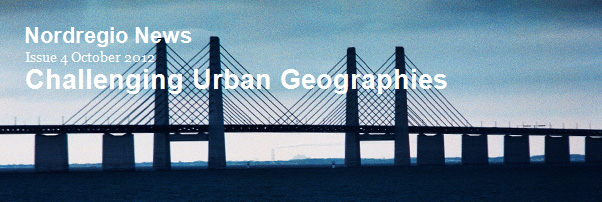
The External Relations of Nordic Cities: A New Geography in the Making?
The rise of the knowledge economy and the application of new technologies have played central roles in the increased focus on cities, both in policy terms and in spatial research over the past three decades. Globally, a number of cities are considered as nodal points in the emergence and the intersection of different kinds of 'flows', such as capital, commodities, knowledge and information, labour, tourism and cultural symbols. These flows are travelling along infrastructure routes such as roads, railways, airlines and, increasingly, telecommunication linkages. In this light, the emerging network of flows between cities can be useful in learning more about how cities function in economic, social and cultural terms. In addition, it can also help us to imagine a geography of cities that is not only based on distances and place-based indicators such as the number of inhabitants, GDP or infrastructural endowment, but rather on the 'inter-connectivity' of cities, which we will take a closer look at in this issue of Nordregio News.
Read more
The Elusive Question of Global Cities and Cities in Networks
By Brita Hermelin
Globalization, urbanization and networks represent important fundamental processes in the recent and current restructuring of society. These three key words imply uneven spatial and geographical development of resources and human settlements that are deeply involved in the emergence and consolidation of world cities and global cities. In recent decades, the globalization of cities has been studied intensively and global cities are defined in various ways.
Read more
Mapping Global Cities and Business Networks from a Nordic Perspective
By Lukas Smas
Cities are important strategic nodes in the global network economy, not least in terms of current policy discussions about city competitiveness. Their importance has resulted in numerous ranking and benchmarking studies focused on internal conditions and city assets. Research, however, has stressed global urban analysis, which examines how cities develop through external relations. Studying Nordic capital regions from such an approach raises questions about established geographical patterns and prevailing mental maps of the networks within which Nordic cities are embedded. A recent study by Nordregio, for example, shows important connections between the Nordic capital regions and not only cities in the new member states of the EU, but also cities in Central and South America and Asia. Recognising these relations has policy implications. It might therefore be time to rethink urban policy-making based on bounded territories and move beyond traditional city borders towards network-focused policies.
Read more
Overcoming Distance Through Attractiveness
By Fredrik Johansson
Political discussions in Sweden about distance and location seem endless. The issue not only arises in the debate over our internal challenges (north/south, centre/periphery), but is also a recurring theme in discussions about Swedish competitiveness. However, changes in the global network economy make absolute distances and locations less important, instead more fundamentally raising the question of a place's attractiveness.
Read more
Back to Nordregio News